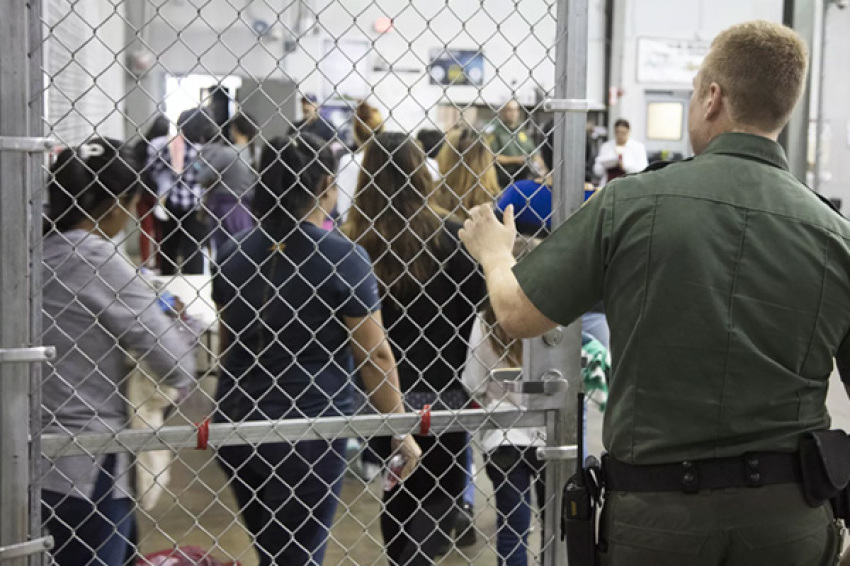Immigrant families belong together in 2019

2018’s headlines have been dominated by immigration-related stories of family separation — and 2019 is likely to see many more families kept apart.
Last summer saw non-stop coverage of the “zero tolerance” policy implemented by the Trump administration along the U.S.-Mexico border. In response to widespread outcry, the president rescinded the policy that separated children from their parents on June 20. But even though this particular policy has been revoked, another policy change has been separating families with less fanfare.
The number of refugees resettled to the U.S. has declined precipitously: In 2016, more than 96,000 individuals were resettled to the U.S. to rebuild their lives; in 2018, fewer than 23,000 arrived – a decline of more than 75 percent. Although this policy is not specifically designed to keep families apart, that is inevitably what it winds up doing.
Many refugees are coming to join family who are already in the U.S. In recent years, more than 60 percent of the refugee resettlement cases that World Relief has received have been family reunification cases. When the total number of refugees admitted declines so starkly, it’s not just refugees themselves who are affected: It’s also their U.S.-based family members, whose hopes of reunification are deferred, if not dashed entirely.
My friend Peiman is one example. He and his parents were chosen for resettlement because, as non-Muslims, they faced persecution in Iran. While grateful for the safety, religious freedom and opportunities he has in the U.S., Peiman is worried about his relatives. They left Iran after being preliminarily approved for resettlement by the U.S. government but, having been denied entry without any specific reason given, are in legal limbo in Austria.
If they are returned to Iran, the dangers they face could be even more grave than when they initially left. But their odds of making it to their family in the U.S. are slim: just nine religious minorities from Iran were allowed to resettle in the U.S. in 2018, compared to more than 3,700 in 2016.
Painful though this is, the most significant family separation policy could be still to come. U.S. law has long restricted those likely to be primarily dependent upon public benefits – known as “public charges” – from immigrating to the country. This doesn’t affect many would-be immigrants, since most immigrants do not initially qualify for means-tested public benefits programs. A U.S. citizen relative can generally establish their immigrant relative’s eligibility by legally committing to be financially responsible for their immigrant family member.
In October, however, the Department of Homeland Security proposed new rules to redefine who will be excluded as a “public charge.” The proposal would grant bureaucrats broad discretion to deny immigrant visa petitions based on the mere suspicion that the would-be immigrant might someday qualify for public benefits. If the proposed rule is finalized, officers will be instructed to consider a variety of factors when issuing visas. Under these proposed rules, about seven in ten individuals granted green cards in the last five years would have at least one “negative factor” that might lead them to be denied at an officer’s discretion.
A couple my coauthor and I profiled in our book, Welcoming the Stranger, serves as an example. Alison, a U.S. citizen, is a public school teacher in Illinois. Her petition for her husband, Francisco, was approved in 2017, and he was granted a green card. At that time, her income was about $50,000, but Francisco’s work as a pastor was on a volunteer basis, since his denomination could not pay him until he received work authorization. This put the couple and their twin sons well below the income threshold that would put them in the clear under the proposed guidelines.
Francisco is now contributing in a plethora of ways as a pastor and a father to two special-needs children. Neither he nor anyone else in his family receives public benefits, and they’re paying their fair share of taxes. But had this rule been in place in 2017, Francisco’s application to reside lawfully with his wife and kids could have been denied. By one estimate, as many as 200,000 spouses might be denied annually, forcing families into the impossible choice of living apart or leaving the U.S. altogether. Family separation could expand well beyond anything that made headlines in 2018.
Many prominent evangelical leaders – who have long championed “family values” – are speaking out against the proposed public charge rule, as they did against the zero tolerance policy and the decline of the refugee resettlement program. In the words of a recent statement of the Evangelical Immigration Table: “Policies that separate or bar the reunification of families are deeply troubling. We believe that all government policy – including immigration policy – should promote the strength and unity of families wherever possible.”
Coming away from family gatherings during the holidays, I’m praying that the new year brings a shift in immigration policies that will more quickly reunite families, rather than ripping them apart.



























